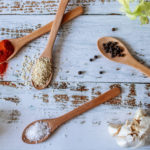
Supplements – the WHY and the WHAT…
Those of you that work with me know that I myself “play” with a lot of supplements. But you also know that my diet is very clean and full of fresh organic produce, legumes, nuts, seeds and grains – all plant foods filled with vitamins, minerals and phytonutrients. I also eat organic, pasture-grown animal products which I know are raised without antibiotics, hormones or inappropriate feed. So it’s not unreasonable to ask – why do I supplement and why should anyone do it if they eat a healthy diet?
The answer is twofold – it involves the depletion of nutrients in our food and the increase in the toxic load our bodies face daily.
This great article in Scientific American (http://www.scientificamerican.com/article/soil-depletion-and-nutrition-loss/) summarizes several studies showing the staggering depletion of key vitamins and minerals in our food. Would it shock you to find out that according to one study, calcium levels in 12 fresh vegetables dropped 27 percent between 1975 and 1997? Iron levels – 37%; vitamin A – 21% and vitamin C – 30%. Experts link this phenomenon to several factors, including soil depletion, hybridization and the modern farming practices. Our produce is picked weeks before we lay our hands on it – prior to ripening, thus shortchanging the natural growing process. Fruits and vegetables are bred to be larger, prettier and to maximize shelf life – diluting the vitamins and minerals even further. And commercial farmers don’t rotate crops, depleting the soil because every crop has its own unique mineral requirements…
According to Donald Davis, a researcher and the University of Texas, Austin: “Efforts to breed new varieties of crops that provide greater yield, pest resistance and climate adaptability have allowed crops to grow bigger and more rapidly, but their ability to manufacture or uptake nutrients has not kept pace with their rapid growth.”
The second half of the supplement equation comes from the fact that we are exposed to an increasing number of toxins on a daily basis. We live in a chemical soup – from the food we eat to the air we breathe; from the water we drink to the lotions we use; from the chemicals in our furniture to the toxins in our cleaning products – the list goes on and on. These chemicals tax our body’s detoxification systems which need a variety of vitamins, minerals, amino acids and fatty acids to function correctly. The body does the best it can – pulling key nutrients out of our bones and tissues and storing the toxins it can’t metabolize into fat tissue. Eventually, the body can’t keep up and illness sets in. Nutrient deficiencies can be linked to a host of diseases – from Type II Diabetes, to hypertension, and many others.
So there is the rub – we require more key nutrients but are getting less from our food.
So let’s say I have convinced you that supplementation is not such a bad idea – it’s an insurance policy of a sort. It’s important to remember that supplements are not THE answer, but they are a part of it. Real, whole food is still needed. Even if you could get your basic vitamins and minerals from a supplement, what about the hundreds of other plant compounds that we know exist but can’t be reproduced and put into a pill? You still need to eat real food – but take a supplement too, just to be safe.
What about supplement quality? You may have seen stories in the media targeting several store brand supplements for contamination, mislabeling and incorrect or missing ingredients. The herbal supplement industry is not regulated by the Food and Drug Administration; in fact, the 1994 Dietary Supplement Health and Education Act (DSHEA) took the FDA out of the process of approving and monitoring dietary supplements. Each manufacturer is responsible for the safety and quality of their own products.
So where does this leave us? I use and recommend pharmaceutical grade supplements which are manufactured by responsible companies which self-police. Many of them are certified by GMP – Good Manufacturing Practices; they have complete control and auditing capability over the supplement creation process including all the vendors supplying the raw materials going into a product. These companies allow and encourage third party audits and welcome testing and feedback on their product lines.
So please, don’t buy your supplements at your “regular” grocery store, drugstore or box store. Go to a good independent pharmacy, Whole Foods or another organic market. Talk to the salespeople and ask them about the brands you are considering. If they don’t have the answers, get them yourself. Visit the companies’ websites and review their quality standards. Here are a couple of additional resources to help you find a line you can trust: The National Center for Complementary and Integrative Health (https://nccih.nih.gov) and the National Institutes of Health Office of Dietary Supplements (http://ods.od.nih.gov). Please discuss any and all supplementation with your doctor, especially if you are taking a prescription medication.
Better be safe than sorry.






